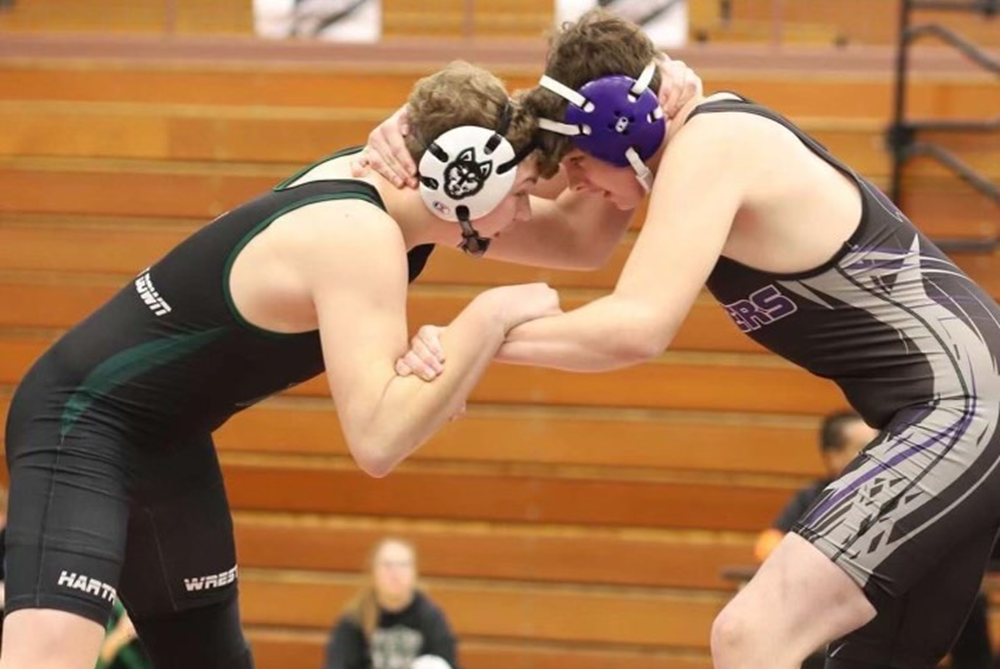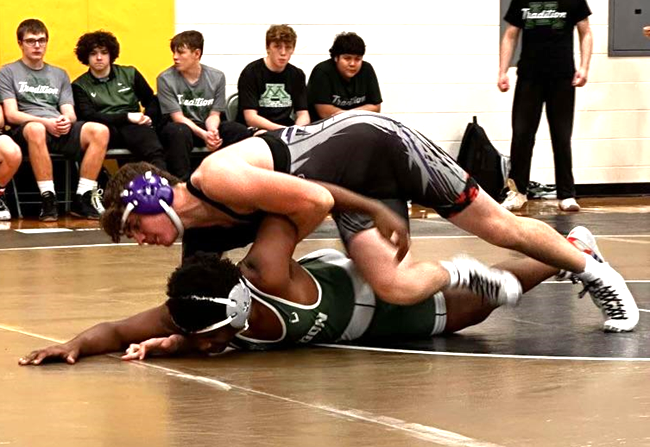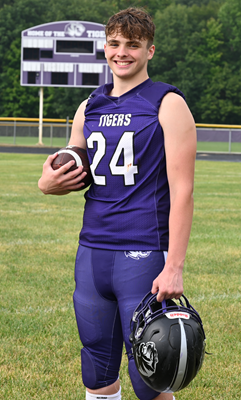
Thank Roosevelt for Football Weekends
December 20, 2013
By Rob Kaminski
MHSAA benchmarks editor
The next time you find yourself immersed in a tense crosstown football rivalry on a Friday night followed by a Saturday pilgrimage to the nearest college campus and a Sunday afternoon with a remote and your favorite snacks and beverages, take a moment to consider what the weekend would be like if it weren’t for Teddy Roosevelt.
The man who became our 26th President shortly after the turn of the 20th Century following the assassination of William McKinley in 1901 was a football fan like you. Maybe more so.
Today’s game of football has reached a critical crossroads. Player size and speed have increased across the board. Savage use of equipment as weapons rather than protective gear has been glorified on television networks and social media. Leaders of the game at all levels have recognized the need for change, employing new rules and widespread educational efforts to aid in preserving the sport.
History, as they say, is repeating itself.
In an ironic twist, it was Roosevelt who saved the then-brutally violent game of football from itself more than 100 years ago. Yes, the same “Rough and Ready Teddy” who led the charge up San Juan Hill during the Spanish-American War and often sparred in the boxing ring while in office from 1901-09 opined that football was becoming so gruesome that he delivered an ultimatum: clean up the game or it would be outlawed.
The Chicago Tribune reported that in 1904 alone, there were 18 football deaths and 159 serious injuries, mostly among prep school players. Football deaths suffered by younger players were reported on a nearly weekly basis, as outraged citizens called on colleges and high schools to banish football outright.
In stepped Roosevelt, who called head coaches and representatives from Harvard, Yale and Princeton – college powers at the time – to the White House in 1905 urging them to eliminate excessive violence and set an example of fair play for the rest of the country. When the casualties actually rose by one during the ensuing season, Roosevelt reacted with greater resolve and convened leading football authorities for the purpose of authoring drastic rules changes. What emerged was an intercollegiate conference which was the predecessor of the NCAA.
Among the most effective changes for the 1906 season were the legalization of the forward pass, the elimination of mass formations, and the creation of a neutral zone. Football fatalities fell to 11 in each of the next two seasons, and severe injuries fell drastically.
Thanks to the introduction of protective equipment and ever-evolving rules changes, football during the 100-plus years to follow has become an exponentially safer game. Yet, the game’s leaders always will need to adjust and react to scrutiny that comes with the territory.
So, as the game once again undergoes rules modifications in the name of safety, give a tip of the cap to President Roosevelt while you enjoy college bowl season and the NFL playoffs and begin to think ahead to the first high school practice of 2014.

Inspired by Dad's Memory, Lawrence's Vasquez Emerges After Family Losses
By
Pam Shebest
Special for MHSAA.com
January 16, 2024
LAWRENCE — While COVID-19 affected many students in different ways, it definitely made an impact on Austin Vasquez.
 As a freshman at Lawrence High School during the pandemic, Vasquez lost his grandmother Theresa Phillips to cancer on March 25, 2021.
As a freshman at Lawrence High School during the pandemic, Vasquez lost his grandmother Theresa Phillips to cancer on March 25, 2021.
Two days later, on March 27, his father Tom Vasquez, died of complications from COVID. And on April 19 that spring, his grandfather Darrell “Gene” Phillips also lost his fight against the coronavirus.
“There is no way (to cope). You just have to keep on moving,” Austin said. “It’s what (my dad) would want me to do.
“He was my biggest (influence) in sports. He talked to me about never giving up – leave everything you’ve got.”
That is just what Vasquez is doing in the midst of his three-sport senior year.
He is the top wrestler at the school, competing at 175 pounds with a goal of making the MHSAA Tournament. He was a versatile contributor on the football field this past fall, and he’s planning to join the baseball team this spring.
 He’s 8-3 with six pins on the mat this winter after a busy summer of camps and tournaments. Those experiences helped lessen the nerves he’d felt during matches previously, and now he’s wrestling with an outlook of “everything to gain and nothing to lose.”
He’s 8-3 with six pins on the mat this winter after a busy summer of camps and tournaments. Those experiences helped lessen the nerves he’d felt during matches previously, and now he’s wrestling with an outlook of “everything to gain and nothing to lose.”
And Vasquez said he feels his dad’s presence as he prepares for competition.
“Before every match, before every game, I just think about what my dad would be telling me,” he said. “Everything he’s always told me has taught me to get better.
“In life, I still remember everything he taught me. He was definitely a great man, and I want to be like him someday.”
Wrestling also has made Vasquez more in tune with his health.
His sophomore season he went from 230 pounds to 215, and by his junior year was down to his current 175.
“I just wanted to be healthier, not just for wrestling,” he said. “I started going to the gym every night, watched my calories, and from there grew (taller).
“Now I’m at 6-(foot-)2, and I don’t know how that happened,” he laughed.
Lawrence coach Henry Payne said Vasquez always has a positive attitude and helps the other wrestlers in the program.
“When he notices a kid next to him doing a move wrong, he’ll go over and show him the right way,” Payne said. “We have a lot of young kids that this is their first year, and he’s been a good coach’s helper.”
The coach’s helper gig will continue after graduation.
"Next year we’re hoping to open up a youth program here, and I got him and an alumni that graduated last year and is helping the varsity team this year (Conner Tangeman) to take over the youth program for us,” Payne said.
 On the football team, Vasquez was a jack of all trades.
On the football team, Vasquez was a jack of all trades.
“He started at guard, went to tight end, went to our wingback, went to our running back. He was trying to get the quarterback spot,” football coach Derek Gribler laughed.
Vasquez said there is no other feeling like being on the field, especially during home games.
“Wrestling is my main sport, but I’d do anything to go back and play football again,” he said. “I just love it.”
Although the football team struggled through a 1-8 season, “It was still a really fun season,” Vasquez said. “Everybody was super close. Most of us never really talked before, but we instantly became like a family.”
Vasquez had the support of his mother, Heather, and four older sisters: Makaylah, Briahna, Ahlexis and Maryah. He also found his school family helped him get through the end of his freshman year.
“(My friends) were always there for me when everything was going on,” he said. “I took that last month off school because it was too hard to be around people at that time.
"Every single one of them reached out and said, ‘Hey, I know you’re going through a rough time.’ It really helped to hear that and get out of the house.”
 The family connection between Vasquez and Lawrence athletic director John Guillean goes back to the senior’s youth.
The family connection between Vasquez and Lawrence athletic director John Guillean goes back to the senior’s youth.
“I was girls basketball coach, so I coached his sisters,” Guillean said. “I remember him when he was pretty young. I knew the family pretty well. I knew his dad. He was pretty supportive and was there for everything.”
Vasquez said that freshman year experience has made him appreciate every day, and he gives the following advice: “Every time you’re wrestling, it could be your last time on the mat or last time on the field. Treat every game and every match as if it’s going to be your last. If you’re committed to the sport, take every chance you have to help your team be successful.”
Gribler has known Vasquez since he was in seventh grade and, as also the school’s varsity baseball coach, will work with Vasquez one more time with the senior planning to add baseball as his spring sport.
“When we talk about Tiger Pride, Austin’s a kid that you can put his face right on the logo. His work ethic is just unbelievable,” Gribler said. “Everything he does is with a smile. He could be having the worst day of his life, and he’d still have a smile on his face. He pushes through. It’s tough to do and amazing to see.”
The coach – who also starred at Lawrence as an athlete – noted the small community’s ability to rally around Vasquez and his family. Lawrence has about 150 students in the high school.
“It goes beyond sports,” Gribler said. “Austin knows when he needs something he can always reach out and we’ll have his back, we’ll have his family’s back. It’s not so much about winning as it is about the kids.”
Vasquez is already looking ahead to life after high school. He attends morning courses at Van Buren Tech, studying welding, and returns to the high school for afternoon classes.
“I’d like to either work on the pipeline as a pipeline welder or be a lineman,” he said, adding, “possibly college. I would like to wrestle in college, but let’s see how this year goes.
“I’m ready to get out, but it’s going to be hard to leave this all behind.”
 Pam Shebest served as a sportswriter at the Kalamazoo Gazette from 1985-2009 after 11 years part-time with the Gazette while teaching French and English at White Pigeon High School. She can be reached at [email protected] with story ideas for Calhoun, Kalamazoo and Van Buren counties.
Pam Shebest served as a sportswriter at the Kalamazoo Gazette from 1985-2009 after 11 years part-time with the Gazette while teaching French and English at White Pigeon High School. She can be reached at [email protected] with story ideas for Calhoun, Kalamazoo and Van Buren counties.
PHOTOS (Top) Lawrence senior Andrew Vasquez, right, wrestles against Hartford this season. (2) Vasquez works on gaining the advantage in a match against Mendon. (3) From left: Lawrence wrestling coach Henry Payne, athletic director John Guillean and football and baseball coach Derek Gribler. (4) Vasquez also was a standout on the football field. (Wrestling and football photos courtesy of the Lawrence athletic department. Headshots by Pam Shebest.)

